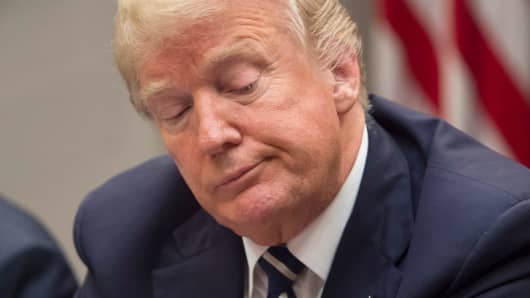Newsflash: President Donald Trump isn't a politically correct or polite person.
Okay, that's not really news. But it's top of mind right now after several sources reported that Trump, when asked about protections for immigrants from Haiti, El Salvador and African countries, said: "Why are we having all these people from s---hole countries come here?"
Friday morning Trump denied he used that exact language but admitted he used tough words. He also denied saying anything about Haitian people:
Trump tweet
Trump tweet 2
An inevitable, but regrettable media freakout continues over his comments.
It's regrettable for a number of reasons. First, the president is being attacked by a sanctimonious crowd that has routinely denigrated the living conditions of the countries Trump was talking about.
In fact, those terrible conditions are often cited by open borders advocates as the primary reason why the U.S. should allow people from those nations into our country as refugees.
President Barack Obama was one of those people using harsh, just not profane, words to describe his father's home country of Kenya while he was actually visiting there in 2015.
He said the country was improving economically. But he also scolded the people and leaders of Kenya for "stupid" traditions like holding back women economically through a lack of education access and practicing female genital mutilation. He assailed the nation's "cancer of corruption" and tribal culture that was "doomed to tear (it) apart."
Obama was exactly right. No, he didn't use profanities. But using words like "stupid" to describe another country's traditions isn't exactly Emily Post material.
The hypocrisy doesn't stop there. The idea that our political leaders shouldn't use vulgarities is certainly something we can discuss in our homes and schools. But the mainstream news media long ago forfeited any right to be sanctimonious about that.
This is the same news media that cheered then Vice President Joe Biden's "this is a big f**king deal" comment to Obama when he signed the Affordable Care Act. It's the same media that barely called out Los Angeles Mayor Eric Garcetti when he deliberately used the F-word in a public celebration for the Stanley Cup champion L.A. Kings in 2014.
So when Trump uses vulgarity, it's different. It's apparently license to definitively conclude, for the umpteenth time, that he is a racist. This is the dominant narrative right now even as the president insists he meant no insult to actual people and was just describing the universally accepted sorry state of things in their countries.
Simply put, this is a stretch. It's something humorist and "Dilbert" comic strip creator Scott Adams calls the "psychic psychiatrist" illusion. That is, when we hear words from someone we don't know personally that could be innocuous but decide we know their real intent.
But the biggest reason this focus on the president's alleged vulgar choice of words is regrettable is that it's clouding the real debate.
Here are some of the questions we need to be asking and answering about immigration instead of once again wasting hours and hours parsing Trump's every little word:
- We want to be compassionate, but is family-based chain migration fair to our existing citizens and best for our economy?
- Would a new focus on bringing in more skilled workers from countries that produce them be a better idea? Conservatives and even some top labor advocates think so.
- If we all agree that the so-called "dreamers" are in a tough spot because their parents brought them here illegally as children, isn't it a very good idea to better secure our borders so that this scenario does not keep repeating itself?
- Are Democrats and Republicans only looking at immigration from the lens of election results? Do Democrats want immigration from impoverished countries with unskilled immigrants because they tend to vote Democrat? And do Republicans favor more skilled immigrants from places like India because there's a better chance they'll vote Republican? How about a little honesty here?
There's also a time element involved here as the Jan. 19 deadline for a spending bill looms larger. If Congress can't agree on a DACA rule protection for the "dreamers," the government could be shut down. Trump balked at a bipartisan deal reached on DACA, saying it needed to provide better border security.
The fact is this country deserves to have a calm and fair debate about our immigration policies. Yes, Trump's harsh words have hurt that cause. But the people deciding to make those words from a closed meeting a major story and mine them for political capital are even guiltier of causing this distraction right now.
Of course, politicians on both sides have long since established that scoring political points is much more important to them than sound immigration policy, compassion for refugees or concern about vulgarity.
And that's the greatest vulgarity of them all.
Commentary by Jake Novak, CNBC.com senior columnist. Follow him on Twitter @jakejakeny.
For more insight from CNBC contributors, follow @CNBCopinion on Twitter.



